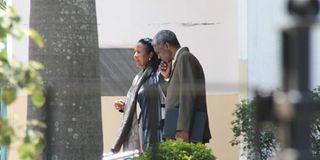Can President Uhuru Kenyatta appoint a non-Kikuyu NIS boss?

Amina Mohammed and Michael Gichangi leave Harambee House after a meeting on October 13, 2010. FILE PHOTO | JENNIFER MUIRURI |
What you need to know:
- The real test of Mr Kenyatta’s nationalistic credentials will be who he picks to replace Michael Gichangi as National Intelligence Service (NIS) director-general.
- With all the State secrets at an intelligence chief’s disposal, the job easily ranks as the most important to a president personally.
The latest round of appointments, transfers and promotions announced by State House last week have not changed the monoethnic character of some key government dockets like the Treasury and Internal Security where it has been presumably possible to get a quorum to justify conducting a meeting in the vernacular.
Some critics have already seized on the presence of familiar political names Robinson Githae, Chirau Mwakwere and Sam Ongeri on the list to try to find fault with President Uhuru Kenyatta’s shakeup of his administration, mainly affecting principal secretaries and ambassadors.
Still others might emerge to cast it as an act of tokenism by State House, citing the fact that the President has waited until the fourth and fifth tier of senior public appointments to try to spread the jobs around.
My reading of it is that Mr Kenyatta was attempting a PR stunt to hopefully deflate the agitation for a referendum that gathered steam with the entry of some eye-catching new players last week.
The real test of Mr Kenyatta’s nationalistic credentials will be who he picks to replace Michael Gichangi as National Intelligence Service (NIS) director-general. (READ: This is why Michael Gichangi had to go)
TALENT SEARCH
Would such the President’s talent search end up producing an intelligence chief from outside the President’s Kikuyu ethnic community or the two communities from which the ruling Jubilee coalition draws its bedrock support?
I would say fat chance. Even if that were to happen the man or woman would practically be a figurehead, much the same way Joseph ole Lenku is the Interior Cabinet Secretary and Rachelle Omamo Defence.
With all the State secrets at an intelligence chief’s disposal, the job easily ranks as the most important to a president personally, and the chance to hire one hardly presents itself more than once during a president’s term.
One can place a safe bet, for instance, that matters around the International Criminal Court trial of President Kenyatta and Deputy President William Ruto will be a factor in the selection of the next spy chief.
And in the world of Kenya’s murky politics, the line between the intelligence chief’s role and that of the sitting president’s chief election campaign strategist has also recently got blurred.
In the past two controversial presidential elections, the Opposition has sought to link the NIS to rigging alongside the electoral commission.
The pressure-cooker politics in the build-up to 2017 suggests another closely contested election is on the cards and that the President will have to be at his wits’ end to win a second term.
The long and short of it is that the ICC cases and the strategic importance of the NIS politically mean that the director-general’s job will certainly go to a person the President trusts. Recent appointments suggest he trusts his people. But I might be wrong.
The writer is Chief Sub-Editor, Business Daily; [email protected]





